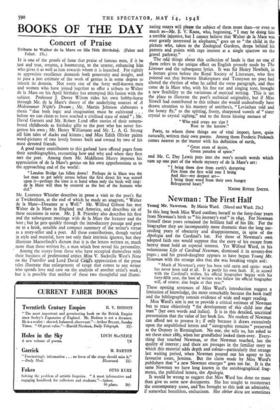BOOKS OF THE DAY
Concert of Praise
Tribute to Walter de la Mare on His 75th Birthday. (Faber and Faber. 15s.)
IT is one of the proofs of fame that praise of famous men, if it be just and true, returns, a boomerang, to the utterer, enhancing him who gives it as well as him towards whom it is launched. For rightly to appreciate excellence demands both generosity and insight, and to pass a just estimate of the work of genius is in some degree to inherit its domain. Not every one of the forty well-known men and women who have joined together to offer a tribute to Walter de la Mare on his April birthday has attempted this fusion with the subject. Professor J. Dover Wilson rides his own hobby-horse through Mr. de la Mare's theory of the underlying sources of A Midsummer Night's Dream ;. Mr. Martin Johnson elaborates a thesis " that both logic and imagination must be cultivated . . . before we can claim to have reached a civilised state of mind" ; Mr. David Garnett and Mr. Robert Lynd offer stories of their remem- bered childhoods as birthday gifts to the poet who has never for- gotten his own ; Mr. Henry Williamson and Mr. L. A. G. Strong cell him tales of ducks and kittens ; and Miss Edith Olivier paints word-pictures of two lovely houses built and owned by two of his most devoted friends.
A good many contributors to this garland have offered pages from their autobiographies, recounting how and why and when they first met the poet. Among them Mr. Middleton Murry imposes his appreciation of de la Mare's genius on his own apprehensions as to the approaching end of the world: "London Bridge has fallen down! Perhaps de la Mare was the last man to get safely across before the first direct hit was scored upon it—perhaps the time is at hand when only the birds will sing: de la Mare will then be counted as the last of the humans who did."
Mr. Laurence Whistler describes in prose a visit to the poet's flat at Twickenham, at the end of which he made an anagram, " Walter de la Mare—Dreamer at a Well." Mr. Wilfred Gibson has met Walter de la Mare in England and America, and describes six of these occasions in verse. Mr. J. B. Priestley also describes his first and the subsequent meetings with de la Mare the lecturer and the host ; but he gets quickly through the introductory passage and goes on to a brisk, sensible and compact summary of the writer's virtue as a story-teller and a poet. All these contributions, though varied in style and material, have not only their intrinsic ipterest, but they illustrate Maeterlinck's dictum that it is the letters written to, much more than those written by, a man which best reveal his personality.
Among the essays from those who have occupied themselves with their business of professional critics Miss V. Sackville West's Note on the Traveller and Lord David Cee,il's appreciation of the prose tales illustrate that enlargement of range that comes to any writer who spends love and care on the analysis of another artist's work ; but it is possible that neither of these two thoughtful and illumi- nating essays will please the subject of them more than—or even so much as—Mr. E. V. Knox, who, beginning, " I may be doing him a terrible injustice, but I cannot believe that Walter de la Mare was ever greatly interested in elephants," goes on to " the child in the picture who, taken to the Zoological Gardens, drops behind his parents and points with rapt interest at a single sparrow on the gravel pathway."
The odd things about this collection of lauds is that no one of them refers to the unique effect on English prosody made by The Listener and the subsequent lyrics. It was Sir Henry Newbolt, in a lecture given before the Royal Society of Literature, who first pointed out that between Shakespeare and Tennyson no poet had altered the rhythm of what he called the verse paragraph, and then came de la Mare who, with his fine ear and singing tone, brought a new flexibility to the variations of metrical writing. This is not the place to illustrate the poet's technical originality, but if Miss Sitwell had contributed to this tribute she would undoubtedly have drawn attention to his mastery of antithesis, " Leviathan told and the honey fly," to the spitting, frosty, sharpened vowels of " sister crystal to crystal sighing," and to the fierce hissing menace of
" Who said crops are ripe ? Rust to the harrow."
Poets, to whom these things are of vital import, have, quite naturally, written their own poems. Among them Frederic Prokosch comes nearest to the master with his definition of earth,
" Great atom of desire, Green paradox of space."
and Mr. C. Day Lewis puts into the noet's mouth words which sum up one part of the whole mystery of de la Mare's art : " I bring them dew from earth's dayspring Fire from the first wild rose I bring And this—my deepest art— I bring them word from their own hungry
Beleagueied heart."
NAOMI ROYDE SMITH.






























 Previous page
Previous page